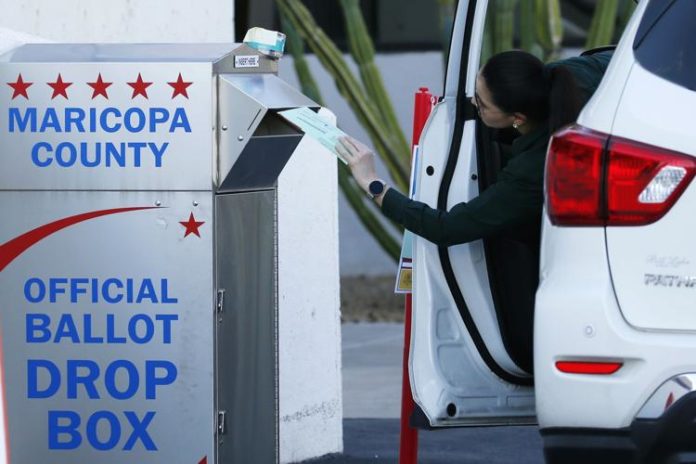
A group that was circulating petitions in hopes of blocking three new election laws they contend amount to voter suppression failed to collect enough signatures, organizers said Tuesday.
The group needed to file nearly 120,000 valid signatures to prevent the laws approved by the Republican-controlled Legislature earlier this year from taking effect. But they fell well short and will not file with the Arizona Secretary of State by Tuesday’s deadline, said Alison Porter, senior advisor for Arizona Deserves Better.
“We weren’t there on any of them,” Porter said. “I do feel like we won in terms of creating more awareness of what our legislators are doing in the name of representing Arizonans at the Capitol.”
Meanwhile, another group that was collecting signatures to block three big tax cut bills was set to file their petitions Tuesday afternoon.
The tax cut bills enacted by the Legislature and signed by GOP Gov. Doug Ducey in late June would cut taxes by nearly $2 billion a year by phasing in a flat tax that mainly benefits the wealthy. They also would shield high-earning taxpayers from a 3.5% additional levy voters approved last year through Proposition 208, and a separate bill would exempt small business owners from being liable for the new tax.
“We’re turning in hundreds of thousands of signatures,” Beth Lewis, executive director of Save Our Schools, Arizona said Monday. “And I’m confident that we’re going to turn back the attacks on Prop. 208 and keep $1 billion in our classrooms every single year.”
Lewis’ group is part of a coalition of education advocates opposed to the tax cuts. They argued that they will prevent the Legislature from boosting funding for schools and other important spending priorities. Arizona is near the bottom for school funding among the 50 states.
Arizona’s constitution allows voters to block new legislation by collecting signatures from 5% of the people who voted in the past general election. If the petition sheets and signatures are verified by the Secretary of State and county recorders, the law is put on hold until voters can weigh in at the next general election. That will be in November 2022.
Porter said her group relied on volunteers and did not use paid circulators. Collecting large numbers of signatures on a tight time frame using only volunteers is extremely difficult.
“I don’t think that the lack of signatures is any indication of the voters not being opposed,” Porter said. “It was simply a matter of getting enough petitions in front of enough people.”
Arizona Deserves Better was trying to block a bill requiring that voters who do not vote in two election cycles be removed from the list of people who automatically get mailed ballots, and a second blocking election officials from taking private grants.
A third measure contains a host of what Republican backers call “election security measures” but that opponents say are designed to suppress the vote and compromise the privacy of the ballot.
A judge on Monday blocked that law from taking effect as part of a larger lawsuit targeting provisions in several budget bills, including a ban on school mask requirements.
Republican backers argued the new election laws were needed to provide election security measures.
The coalition opposing the tax cuts also includes the Arizona Education Association teachers union, Children’s Action Alliance, Center for Economic Progress, Arizona Interfaith Network, Stand With Children, and Invest in Arizona Now, the renamed group that got Proposition 208 on the ballot.
Save Our Schools Arizona has experience in voter referendums — it organized in early 2017 to oppose and successfully refer to the ballot a new universal school voucher law. Voters overwhelmingly rejected the voucher expansion the following year.
Republished with the permission of the Associated Press.













